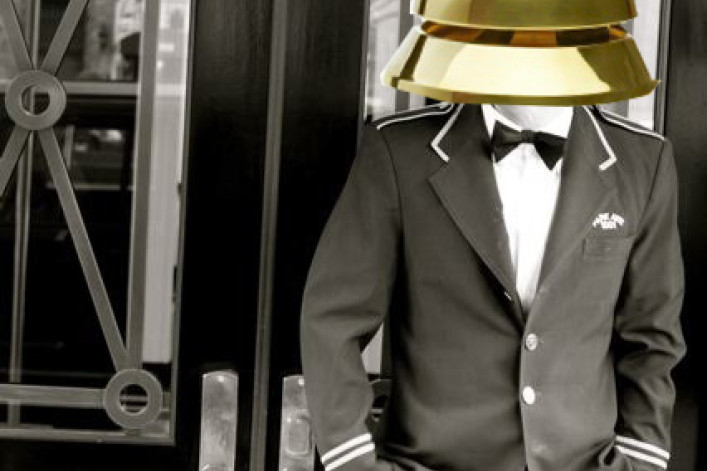How to concierge your doorman

Last month, New York City landlord Rockrose Development sent every doorman from its eight luxury rentals to “school” taught by Waldorf Astoria Hotel head concierge Michael Romei. The mission: To up their lobby game with some concierge-style knowhow about the nuances of personal service.
So how can your doorman be more like a concierge? Romei passed along some pointers to us, below. We’ve asked BrickUnderground contributor and real-life doorman Openthedoor-man to give us his take on each tip.
- A doorman should not only answer politely when asked the best place in the neighborhood to get coffee. He should also know the right answer and directions. Your doorman should "walk through the neighborhood and notice what’s opened, what’s closed, and what sorts of business tenants would want to know about,” Romei told us. OTDM: Agree. Working in the same building for many years, one should know where the best cup of coffee is, the best slice of pizza, where to catch the nearest train or bus. If a doorman has good knowledge about these things, odds are the residents will come to see him as a favorite.
- A residential building doorman might not interact with tourists as much as a hotel concierge, but he should also know the locations of city landmarks and how to travel the major bridges, tunnels, and highway systems in and out of the city. OTDM : Don't agree. I would say it’s a bonus.
- Romei discourages the use of building lingo and improper grammar and instead, encourages “approachable formality.” That means doormen should know the names of every tenant--from adults to children to the family dog. Then he or she should use these names once or twice in each interaction. OTDM: Agree. Like any job, if you choose to talk to a coworker in your native language or using slang terms, do it when no one is around.
- A doorman should try to begin almost every conversation with “good” -- “Good morning,” “Good afternoon,” etc. It sets the tone for a pleasant interaction. OTDM: Putting personal conversations aside, our job is to be polite regardless. It gives the residents a calming feeling even if they may be having a certain issue at a particular moment.
- Never use command forms of verbs, because tenants don’t have to or need to do anything,” Romei commands. “Instead of saying, ‘You need to take a left to get to the elevator,’ you should say, ‘Please take a left to find the elevator.’” OTDM: It’s about formalities, being polite. Doormen should be personable. This ensures residents feel comfortable with the person working the door and helps establish a relationship with this person.
- In fact, speech should be formal and drawn out. Don’t be terse. Instead of “hi,” say “hello.” Instead of “ma’am,” say “madame.” And never, ever say “Okay." OTDM: See above.
- Poor telephone service is the Achilles heel of the hospitality industry, says Romei. Many doormen take more than three rings to answer the phone and don’t speak clearly or with a smile in their voice. Instead, they sound like the phone got in the way of whatever else they were supposed to be doing and are trying to get off the line as quickly as possible. He says pacing, enunciation, and pleasantness are as important as the quality of information.OTDM: Good communication skills are always key for any industry.
- Voice is important on the phone and in-person. The ideal doorman has a lower-pitched voice, because it projects and carries better, with rising inflections toward the end. Monotones are a no-no. OTDM: I've never really tried this before or never really noticed. I think I speak kind of loud naturally.
- Doormen should keep hands clean and fingernails manicured at all times. When standing, they should have an empty right hand ready for impromptu greetings. OTDM: I would say keep both hands empty. The right for greeting, the other for receiving.
- On the special occasion that a tenant does something nice for a doorman, a concise, but well-written, thank you note is in order. Romei handed out templates of notes totaling no more than five sentences to thank tenants for gratuities and gifts. How do they end? Saying “It is my pleasure to serve you,” of course. OTDM: I don't know about all that. We doorman are constantly doing this and that, so if a person gives us a tip, I believe we're even. That individual felt the need to give something because perhaps the doorman did something for them. We just don't stand around and have dollars thrown at us for looking good. As long as the doorman is polite about it and is grateful, telling the person giving the gift thank you should be enough. If you are speaking about the holidays, then a collective effort by the entire staff should be made in purchasing a card that can be placed in the lobby, greeting everyone and thanking them. This approach might also make someone that didn't give feel bad if they stop to read it.
Abigail Michaels Concierge, which conceived of the idea for doorman school, says it has been approached by numerous real estate and development professionals about holding more doorman school classes.
Rockrose, the landlord, is hoping the extra training will pay off in happier tenants more inclined to renew their leases than hit the road. Will the payoff for doormen come in the form of bigger holiday tips?
"I highly doubt it," says Openthedoor-man. "A resident is going to give depending on their financials first and foremost."



























